|
|
|
Sort Order |
|
|
|
Items / Page
|
|
|
|
|
|
|
| Srl | Item |
| 1 |
ID:
106148
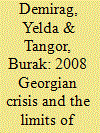

|
|
|
| 2 |
ID:
118003
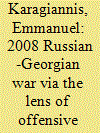

|
|
|
|
|
| Publication |
2013.
|
| Summary/Abstract |
The Russian intervention in Georgia's breakaway republic of South Ossetia in August 2008, Moscow's first-ever use of military force against a sovereign state in the post-cold war period, deserves a theoretical explanation. By following the tenets of Offensive Realism, this article will argue that the US-Russian competition in the South Caucasus is the main cause of the 2008 Russian-Georgian war. During the 1990s, the USA passed the buck to Turkey to contain Russian influence in the South Caucasus. In the early to mid-2000s, however, the Russian-Turkish relations were improved so rapidly that the USA opted, through NATO expansion, to step in as an offshore balancer. Following Bush administration's decision to support the Georgian candidacy for NATO membership and Georgia's ill-fated attempt to seize South Ossetia, Moscow went to war to re-establish hegemony in the South Caucasus. In this way, as the theory of Offensive Realism claims, the Kremlin believes that Russian state will enhance its chances of survival in the anarchical international system.
|
|
|
|
|
|
|
|
|
|
|
|
|
|
|
|
| 3 |
ID:
127486
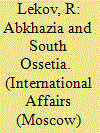

|
|
|
|
|
| Publication |
2013.
|
| Summary/Abstract |
IN TODAY'S DISCUSSIONS on ethno-political conflicts, Abkhazia and South Ossetia are as a rule considered together. Meanwhile, this approach is fraught with too strong a simplification. After all, the two republics, which have broken away from Georgia, have had very different paths to self-determination.
In the Soviet period, Abkhazia was much more poorly integrated into the social, political and cultural space of the Georgian SSR, compared with South Ossetia. Beginning in 1931, the Abkhaz ASSR from time to time witnessed calls for secession from Georgia and the creation of either a separate Union Republic, or for entry into the RSFSR.
|
|
|
|
|
|
|
|
|
|
|
|
|
|
|
|
| 4 |
ID:
097334
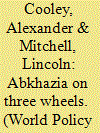

|
|
|
| 5 |
ID:
065889
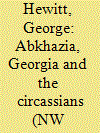

|
|
|
| 6 |
ID:
146763
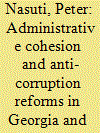

|
|
|
|
|
| Summary/Abstract |
Previous studies of former communist countries have linked decentralisation of power to a greater likelihood of reform. An analysis of the anti-corruption drives in Georgia and Ukraine after their respective ‘colour revolutions’, however, suggests that Georgia’s greater centralisation was integral to its success in enacting anti-corruption measures. In explaining why this contradictory result happened, this article argues that a centralised government can be more effective at implementing reforms than a decentralised one as long as the background and preferences of the ruling administration are conducive to change.
|
|
|
|
|
|
|
|
|
|
|
|
|
|
|
|
| 7 |
ID:
083765
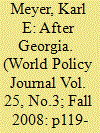

|
|
|
| 8 |
ID:
067076
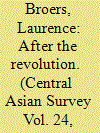

|
|
|
| 9 |
ID:
092962
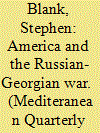

|
|
|
|
|
| Publication |
2009.
|
| Summary/Abstract |
This article analyzes the consequences of the 2008 Russian-Georgian war and the unfocused US response to that war. It describes the negative tendencies in both Russian behavior and European security that were illuminated by the war, and concludes that the West, including the United States, suffered serious geopolitical defeats, with consequences that have not yet been remedied or overcome. Therefore, the West's security situation vis-à-vis Russia and Central Eurasia remains fraught with potential serious dangers.
|
|
|
|
|
|
|
|
|
|
|
|
|
|
|
|
| 10 |
ID:
089336
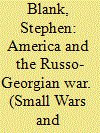

|
|
|
|
|
| Publication |
2009.
|
| Summary/Abstract |
The Russo-Georgian War of 2008 had profoundly negative consequences for European security, which were exacerbated by the inability of the US and Europe, either individually or collectively, to offer any resistance to this aggression. Thus this war and its aftermath showed the effects of incoherent policy-making, enfeebled political will and disunity in the Western alliance. For Washington it also represented a harvest of a misconceived policy towards Georgia that lost control over Georgian policy and may have contributed to Tbilisi's recklessness.
|
|
|
|
|
|
|
|
|
|
|
|
|
|
|
|
| 11 |
ID:
100706
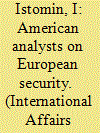

|
|
|
|
|
| Publication |
2010.
|
| Summary/Abstract |
THE PEACE AND SECURITY INSTITUTES of Europe have changed a lot during the two post-Cold War decades yet its image of the most peaceful continent with a stable security architecture is a gross overstatement. There is a mounting concern among some of the European countries with the NATO-centered system or, at least, with some of its aspects. NATO membership for Ukraine and Georgia was one of such debatable issues; the NATO members procrastinated far too long in ratifying the adjusted CFE Treaty until Russia suspended its implementation of the Treaty. The 2008 armed conflict around South Ossetia just added tension to the far from simple situation.
|
|
|
|
|
|
|
|
|
|
|
|
|
|
|
|
| 12 |
ID:
095019
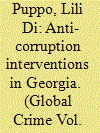

|
|
|
|
|
| Publication |
2010.
|
| Summary/Abstract |
The article aims at analysing the transfer of anti-corruption norms and standards as well as the instrumental use of anti-corruption efforts in Georgia. Drawing on the literature on anthropology and development, I use Georgia as a case study to analyse how an anti-corruption discourse is translated into local agendas. In the first part, I analyse three different perspectives on the fight against corruption in Georgia. In the second part, I examine three different types of anti-corruption interventions to illustrate the various agendas pursued by actors in the anti-corruption field. First, I study the implementation of the national anti-corruption strategy as an example of a conflict between two actors (government and international organisation) to assert the pre-eminence of a particular anti-corruption expertise. Second, I examine the reform of the Chamber of Control of Georgia (CCG), in particular the confrontation between the CCG and the Ministry of Education (MoE) in 2007, as an example of how an external anti-corruption agenda is adapted to local political struggles. Third, I analyse civil society anti-corruption projects as examples of the attempt to maintain a particular donor discourse.
|
|
|
|
|
|
|
|
|
|
|
|
|
|
|
|
| 13 |
ID:
115489
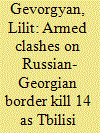

|
|
|
| 14 |
ID:
090141
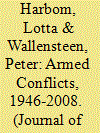

|
|
|
|
|
| Publication |
2009.
|
| Summary/Abstract |
In 2008, the number of active armed conflicts was 36, up by one from 2007. Over the past few years, the number of active conflicts has not seen any drastic changes from one year to the next. However, the number of armed conflicts has increased by nearly one-quarter since 2003, which was the year with the lowest number of active armed conflicts since the 1970s. While the number of conflicts continued to increase, the number of wars (i.e. conflicts with over 1,000 battle-related deaths) remained at a very low level, with only five recorded for 2008. Four conflicts listed in 2007 were no longer active in 2008, but during the year, two conflicts were restarted by previously recorded actors (in Burundi and in Georgia). Furthermore, three new conflicts erupted, one of which was fought between states (Djibouti-Eritrea). Thus, the record-long four-year interlude 2004-07 with no interstate conflict was broken.
|
|
|
|
|
|
|
|
|
|
|
|
|
|
|
|
| 15 |
ID:
095163
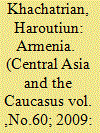

|
|
|
|
|
| Publication |
2009.
|
| Summary/Abstract |
The world crisis interrupted the stable economic growth Armenia had been enjoying for the past fifteen years. Progressive development began in 1994, whereby between 2001 and 2007 the growth indices reached double digits. In 2008, the increase in GDP came to a halt due to the Russian-Georgian war and amounted to only 6.8%. And as early as the first six months of 2009, the GDP began to decrease, dropping as low as 16.3% compared to the same period of the previous year, which is one of the worst indices for the entire CIS. In July, the drop in GDP amounted to 18.7%, which encouraged people to think that the crisis had bottomed out.
|
|
|
|
|
|
|
|
|
|
|
|
|
|
|
|
| 16 |
ID:
118728
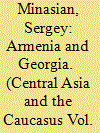

|
|
|
|
|
| Publication |
2012.
|
| Summary/Abstract |
Relations between Armenia and Georgia go back many centuries into the history of these two neighboring nations. The recent history of their relations as two post-Soviet newly independent states is only two decades old, which means that certain problems have not yet been resolved.
Both countries have to cope with political, ethnopolitical, economic, linguistic, and religious problems; the situation in both countries is further complicated by the far from simple processes of nation-building and the countries' involvement in bloody ethnopolitical conflicts in the Caucasus. This has inevitably affected the political and socioeconomic development of both Armenia and Georgia.
|
|
|
|
|
|
|
|
|
|
|
|
|
|
|
|
| 17 |
ID:
131624


|
|
|
|
|
| Publication |
2014.
|
| Summary/Abstract |
European Union (EU) interventions in conflict countries tend to focus on governance reforms of political and economic frameworks instead of the geopolitical context or the underlying power asymmetries that fuel conflict. They follow a liberal pattern often associated with northern donors and the UN system more generally. The EU's approach diverges from prevalent governance paradigms mainly in its engagement with social, identity and socio-economic exclusion. This article examines the EU's 'peace-as-governance' model in Cyprus, Georgia, Palestine and Bosnia and Herzegovina. These cases indicate that a tense and contradictory strategic situation may arise from an insufficient redress of underlying conflict issues.
|
|
|
|
|
|
|
|
|
|
|
|
|
|
|
|
| 18 |
ID:
090419
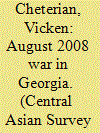

|
|
|
|
|
| Publication |
2009.
|
| Summary/Abstract |
Following the five days' war between Georgia and Russia, a highly politicized debate began about 'who started the war'. While this debate is far from over, it is important to analyse whether the 2008 war marks an important evolution in the series of conflicts that started in the Caucasus simultaneously with the weakening and collapse of the Soviet Union. While in the late 1980s and early 1990s the conflicts were the result of mass mobilization around the banner of the nation, marking a revolutionary period of paradigm shifts, the 2008 war was much closer to classical wars between states and their centrally commanded armies. The direct Russian military intervention, Moscow's recognition of Abkhazia and South Ossetia as 'independent' states, further modifies the nature of the Caucasus conflicts. The 2008 war also reveals how much the Georgian state has evolved since the Rose Revolution, from one described as 'weak state' to a state capable of surviving a military defeat without internal collapse.
|
|
|
|
|
|
|
|
|
|
|
|
|
|
|
|
| 19 |
ID:
134134
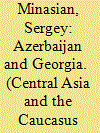

|
|
|
|
|
| Publication |
2014.
|
| Summary/Abstract |
The relations between Georgia and Azerbaijan are a key factor in regional politics and security in the Southern Caucasus. They strongly affect economic contacts and trade, as well as the implementation of all sorts of communication and energy projects. The two countries agree on many issues of regional policy, the way ethnopolitical conflicts should be settled, and the degree to which external actors could or should be involved. Turkey's presence in bilateral Georgian-Azeri relations is another important factor that may end in a geopolitical triangle of sorts in the Southern Caucasus. On the other hand, these relations cannot and should not be described as a formalized full-scale political, let alone, military-political alliance with corresponding mutual obligations. The author discusses these and other aspects of bilateral relations, assesses the prospects for further cooperation, and points to the possible challenges and problems that might crop up later.
|
|
|
|
|
|
|
|
|
|
|
|
|
|
|
|
| 20 |
ID:
092154
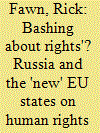

|
|
|
|
|
| Publication |
2009.
|
| Summary/Abstract |
During the August War of 2008, many Western governments that had previously been supporters of Georgia tempered their views on the causes of the conflict and moderated their support for the government of Mikhal Saakashvili. By contrast, the governments of several post-communist countries were forthright in their backing of Georgia. The presidents or prime ministers of Poland, Estonia, Latvia and Lithuania, as well as Ukraine, even travelled to Georgia during the war to demonstrate their solidarity.
|
|
|
|
|
|
|
|
|
|
|
|
|
|
|
|
|
|
|
|
|